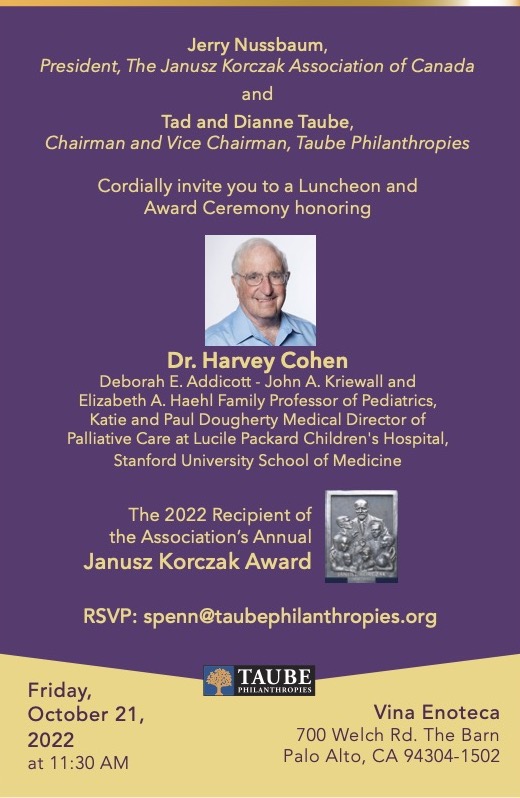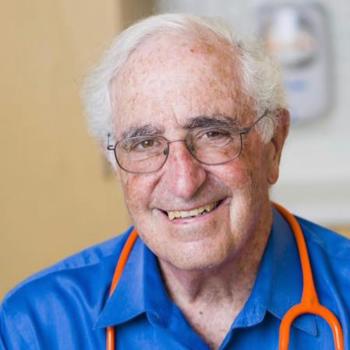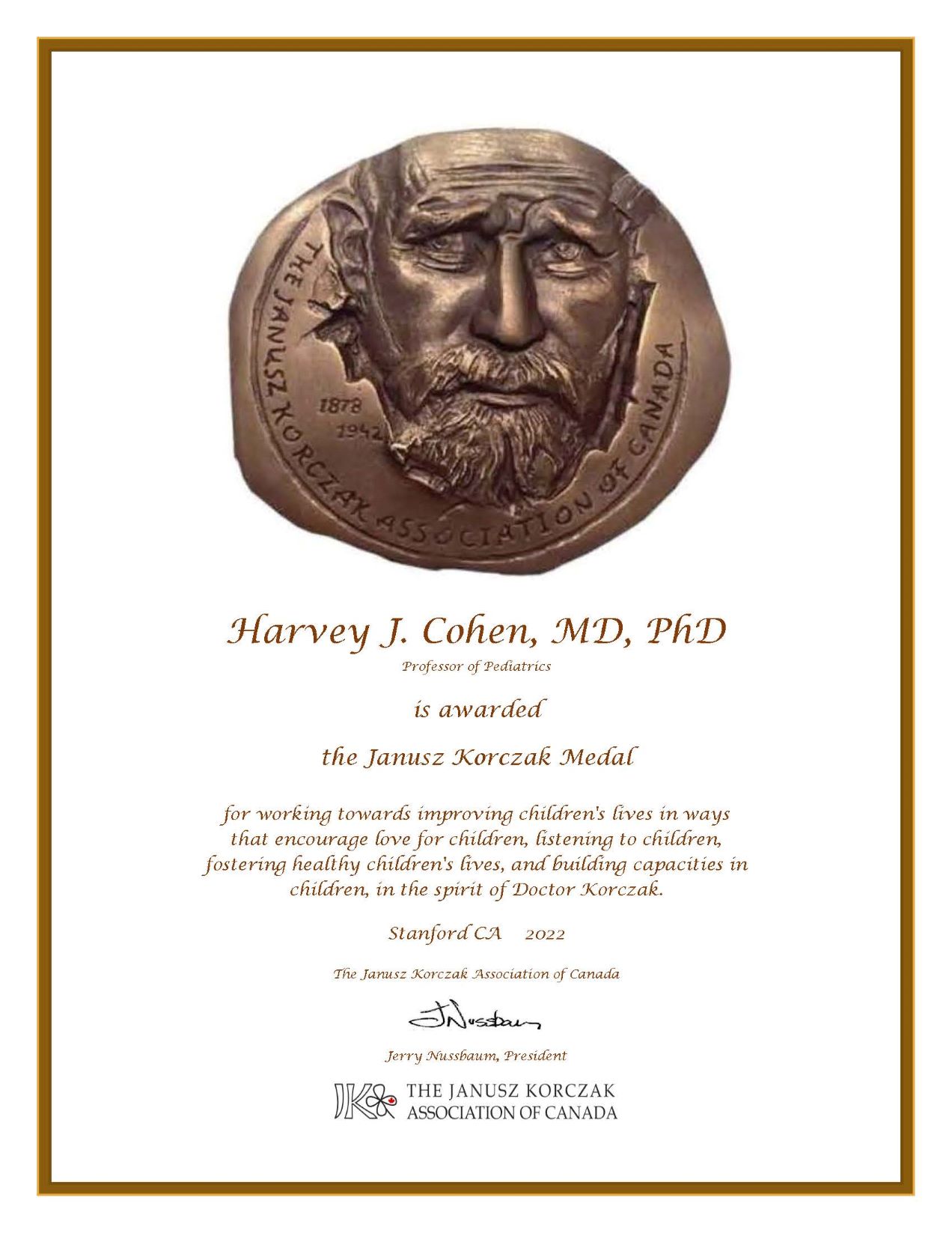The Janusz Korczak Association of Canada is proud to announce the recipient of the Janusz Korczak Medal, Dr. Harvey Cohen. The Medal is awarded to honour Dr. Cohen’s life-long commitment and dedication to children’s health and wellbeing throughout his career in clinical care, teaching and pushing the frontiers interdisciplinary research. With this medal we recognize Dr. Cohen’s outstanding contributions to the promotion of caring for children in ways that encourage love for children, in the spirit of Dr. Korczak.
The Award Ceremony took place in Palo Alto on October 21, 2022.

Dr. Harvey Cohen

I went to medical school because I wanted to do something relevant with research. I discovered that I loved pediatrics for three reasons. The first was that, as I scientist, I wanted to study single diseases at a time—unlike adults, children tend to only have one disease at a time. The second was that I married and had children while in medical school, so I identified with children and parents. The third was that, of all the doctors I met in medical school, the ones I liked best were pediatricians.
When I first entered the field of pediatric oncology, we were only saving about 25 percent of the children. Today, depending on the disease, we are saving closer to 80 percent of children with cancer. Still, a lot of my work is about helping families when treatments are not working. What I find most rewarding is helping families make critical decisions about their children’s health.
Diversity means having different people with unique experiences work together. It occurs in cases when diversity is interdisciplinary, as in our palliative care program when physicians, nurses, chaplains, collaborate to support our families. Diversity exists between age groups, genders, racial and ethnic groups, and this diversity helps us to solve problems in new ways. The students intrigue me the most here at Stanford. The faculty are incredible too, but the students are exceptional. I work with undergraduates, medical students, post docs, and clinical fellows. They are all exceptional. [From A Stanford Profile]
After 14 years of administrative duties, Harvey Cohen, MD, PhD, doesn’t regret handing over the titles of chief of staff of Lucile Packard Children’s Hospital and chair of pediatrics. But there is one moniker with which he’s not yet willing to part—that of Santa for the hospital’s tiniest patients.
“From the minute Harvey got here, he decided it was something he wanted to do,” said Colette Case, the hospital’s director of child and family life services, describing how Cohen has a Santa picture taken with every child and given to the family as a keepsake. “If we ever forget to call him to set it up, he calls us.”
Cohen, who in 1993 succeeded former chair Irving Schulman, MD, stepped down Nov. 15 to re-devote himself to clinical and research pursuits, but he’s not handing over the reins to the sleigh. After all, the holiday role playing fits in perfectly with what the racquetball-playing, bicycle-riding 63-year-old loves best: caring for sick children.
“These past 14 years have been the best of my life,” said Cohen, “but it’s time for someone to come in and take the hospital to the next level of greatness. I’ve missed not being a doctor.” Kenneth Cox, MD, and Christy Sandborg, MD, will serve as interim chair and chief, respectively, until a permanent replacement can be found.
Although his leadership responsibilities left little time to examine patients, Cohen has made a lasting impact on children’s health care—locally and nationally—through his tireless dedication to mentoring, recruiting, legislative lobbying and fundraising.
“During his tenure, he and his colleagues transformed the department of pediatrics and children’s services at Packard Children’s,” said medical school dean Philip Pizzo, MD, who has known Cohen since 1970 when they were both interns at Children’s Hospital Boston.
Packard Children’s was in its infancy when Cohen arrived from the University of Rochester, but he was undaunted by its lack of a proven track record. “The fact that the hospital was quite young was really exciting,” he said. “It was not encumbered by views and thoughts that would prevent the development of a unique institution, one providing comprehensive, child and family-centered care for all kids in an academic atmosphere.”
Over the course of Cohen’s tenure, hospital admissions have more than doubled; outcomes for kids with transplants, cancer, heart disease and cystic fibrosis have dramatically improved; outreach programs have blossomed, and grant support for research in the Department of Pediatrics is up fivefold. The hospital was recently ranked as one of the top children’s hospitals in the country by U.S. News & World Report.
Cohen played a critical role in ensuring that the hospital had sufficient funds to grow. In 2001 the hospital, the School of Medicine and the Lucile Packard Foundation for Children’s Health embarked upon the largest fundraising campaign ever for a pediatric hospital—and reached their five-year goal of $500 million two years early. “We could not have accomplished this without Harvey’s help,” said LPFCH campaign director Linda Collier. “He represents the ‘heart and soul’ of Packard Hospital, providing a welcoming face to patient families and donors alike.” Collier estimates that Cohen solicited or inspired more than seven gifts of $5 million or more, including those that helped establish the Vera Moulton Wall Center, the Bass Cancer Center and the hospital’s CT/MRI suite.
The money also allowed the recruitment of more than 40 high-profile clinicians and researchers as part of the creation of six centers of excellence at the hospital. “The success we have achieved over the past few years is directly attributable to Harvey’s skills in identifying, retaining and recruiting many of our most successful faculty,” said hospital CEO Christopher Dawes. These new arrivals joined many of Cohen’s former trainees and longtime colleagues already on the faculty.
Cohen admitted that there was one aspect of the job that he did not enjoy: Managing what has increasingly become a chronic bed shortage. It was a tough position for a man devoted to ensuring quality care for all. Although the space issues will be somewhat alleviated by the current phase-1 construction, Cohen foresees an ongoing need for new beds as more families and referring physicians demand pediatric-specific care for sick children.
“We want to be able to take care of any child in the community who needs us,” Cohen said. The ability to provide that comprehensive coverage while also expanding clinical offerings and providing top-notch medical education for future generations of doctors was made even more complicated by the substantial effect of managed care on academic medical centers, he said.
What makes it easier for Cohen to step down is that he has encouraged and supported others to take independent leadership roles at the hospital. “Harvey is very skilled at maintaining a ‘hands-off’ approach when he sees that a program is working well,” said his colleague, neonatologist Philip Sunshine, MD. “When he started he immediately instituted a program for associate chairs and hired a director of the residency program. He solicited a lot of input rather than making unilateral decisions.”
In fact, Cohen’s willingness to take advice is what launched him into medicine. His professors at Brooklyn College, impressed by his desire to “do something relevant,” encouraged him to pursue a medical degree to complement his love of biochemistry. When he was accepted into Duke’s MD/PhD program, from which he graduated in 1970, he found that he enjoyed clinical medicine as much as he did research.
“I realized I would have to compromise,” said Cohen. “I couldn’t spend all my time on both medicine and research. But I felt it was extremely important to have individuals who could act as translators to bridge the gap between the two professions.” He settled on pediatrics not just because he likes kids. “I also liked all the pediatricians that I’d met,” he said, “and their combination of science and humanism. I’ve never been disappointed with my choice.”
Although Cohen professes that he will miss the mentoring and recruiting of faculty, residents and students, he’s excited about his upcoming sabbatical in the laboratories of Richard Zare, PhD, and Rob Tibshirani, PhD, where he’ll be using the latest techniques in comparative proteomics to devise new ways to diagnose and treat pediatric diseases. They’d better prepare themselves.
“A well-known aspect of Harvey’s persona is his loving bear hugs,” said Pizzo. “Whenever Harvey greets someone, his arms are extended and enveloping.” While Pizzo knows that it’s a genuine expression of Cohen’s “caring and compassionate” nature, he recalled that as interns together 36 years ago, he wondered whether recipients would be troubled by such ebullience from a lean, dark-haired young man with sideburns and a moustache. Not to worry now. “Times have changed, and Harvey’s appearance is much more cuddly,” said Pizzo. “Giving hugs is something that Harvey has grown into—and it suits him very well.”
And it is a talent Cohen intends to continue to put to use. The annual hospital holiday party is approaching, and young patients and their families, not to mention the hospital staff, will be in need of some good hugs. Besides, that Santa suit is calling. . . . [From a Stanford article in 2006]
The Janusz Korczak Medal

Tad Taube, Taube Philanthropies and the Jewish Heritage Initiative in Poland
Born in Kraków, Poland, in 1931, Tad Taube immigrated to the United States in the summer of 1939. He began his philanthropic journey in 1988, focused on the Bay Area, Poland and Israel. In 2015, he was awarded the Commander’s Cross of the Star of the Order of Merit, Poland’s highest-level official state distinction for a foreign civilian. Since 2007 he has served as Honorary Consul of the Republic of Poland for the San Francisco Bay Area.
In 2003, Taube Philanthropies established the Jewish Heritage Initiative in Poland (JHIP) to strengthen the institutional life of Polish Jews, further awareness and appreciation of Jewish heritage and contemporary Jewish life among Jews and others, and foster positive interest in Poland among American Jews, 85 percent of whom have Polish roots. The JHIP supports the development of a broad-based infrastructure of Jewish educational, communal, religious, and cultural programs in Poland. The JHIP also links Polish Jews and their programs with Jewish communities in North and South America, Europe, Israel, Australia, and the 15 independent states that were part of the former Soviet Union.
The JHIP emphasizes the critical importance of understanding and integrating the history of Polish Jews into a post-Communist and multicultural society; of addressing historical and contemporary antisemitism; and of strengthening the democratic values of a multiethnic civil society in Poland. Taube Philanthropies has strengthened the visibility, reach, and effectiveness of JHIP by enlisting philanthropic partners to co-sponsor JHIP programs that extend over multiple years. Taube Philanthropies is committed to the development of a cadre of leaders equipped to carry forward a future of Polish Jews that reflects the diverse and inclusive values of Jewish Peoplehood, the JHIP participates in collaborative activities with new and established Jewish institutions and programs, such as JCCs, Hillels, museums, synagogues, festivals, and interfaith and multicultural events. It extends support for programs that are religious and scholarly, popular and celebratory, across Jewish communities in Poland, Europe, North America, and Israel that have links with Poland.
Since 2003, the JHIP has disbursed more than 500 grants totaling over $35 million to more than 100 cultural and communal programs and organizations. It provides core support to key institutions and funds programs in Jewish studies scholarship, museum exhibitions, archival preservation, genealogy, community and capacity building, and heritage study tours for youth and adults. It supports the arts and media through grants for specific artistic creations and through ongoing funding to selected organizations. JHIP increasingly devotes its resources to strengthening both local community and global connections.
